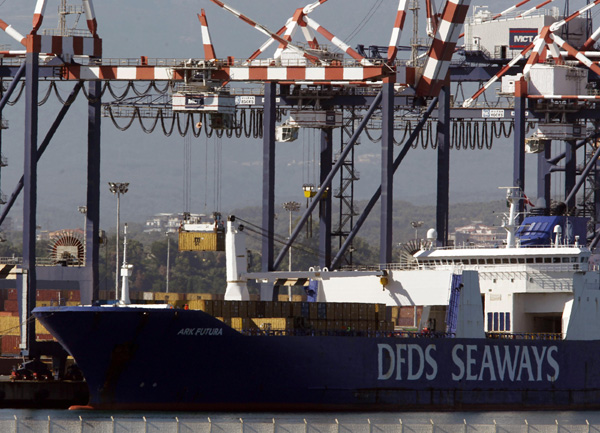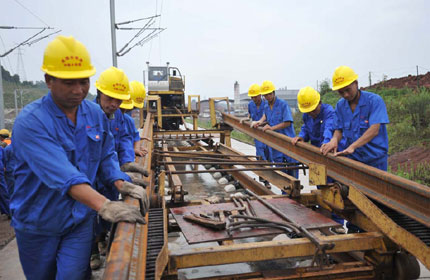Transfer of Syrian chemicals completed at Italian port
Updated: 2014-07-03 10:48
(Xinhua)
|
|||||||||||
 |
|
A container (top L) is moved from the Danish ship Ark Future, carrying a cargo of Syria's chemical weapons, after it arrived at Gioia Tauro port in southern Italy July 2, 2014. [Photo/Agencies] |
ROME - One of the final phases in the dismantling of Syrian chemical arsenal was completed on Wednesday at the Italian southern port of Gioia Tauro.
Seventy-eight containers holding some 560 metric tons of chemicals were transshipped from Danish cargo Ark Futura, which had received the materials at the Syrian port of Latakia in the previous months, to US Navy Cape Ray. The process lasted about 12 hours.
The Cape Ray is specially equipped with two field-deployable hydrolysis systems capable of neutralizing the chemical agents, and would now leave Gioia Tauro port and sail back into international waters to carry on its mission.
The transshipment began on early Wednesday morning at the docks of Gioia Tauro, with inspectors from the Organisation for the Prohibition of Chemical Weapons (OPCW) supervising the operations.
The port was sealed off to create a safety zone. Since Tuesday, checkpoints had been installed on the roads for one-and-a-half square km around the area and a one-km no-fly zone was declared until July 3. A military helicopter and Italy's navy vessels accompanied first US Cape Ray and then Ark Futura when they entered the port.
Italy's Environment Minister Gian Luca Galletti said he was proud of the "transparent and environmentally safe operation".
The minister joined the officers who were monitoring all operations from an Emergency Control Room on Wednesday morning, and then visited Gioia Tauro port to follow the transfer.
According to Galletti, the mission in Gioia Tauro confirmed "the high value Italy gave to international peace and security."
Galletti added he went onsite also to reassure local authorities and people, who were visibly concerned about the possible risks the handling of such lethal substances might represent for public health and environment.
"The serenity of today's operations proves that Gioia Tauro was the right choice," he said.
The 78 containers transferred onto the U.S. Cape Ray on Wednesday held in fact several Syrian chemical agents, including mustard gas and at least one precursor of Sarin gas.
According to Italian authorities, the transfer proceeded at a rate of six to seven containers moved each hour. It was entirely a "ship-to-ship" operation, with containers lifted by cranes from Ark Futura and loaded by a platform onto the Cape Ray. None of them was brought on docks.
The operation went smoothly without incidents, and ended early on Wednesday evening well before the 48 hours predicted before the transfer began. At the end, Italy received the gratitude of OPCW for "offering the use of Gioia Tauro port."
Once back in international waters, the ship Cape Ray will now neutralize the chemicals through hydrolysis in order to make them inert. This process would take up to 60 days, OPCW said. The Ark Futura will sail to Britain to offload the remnant of the chemicals to another facility for destruction.
This entire process resulted from an international agreement brokered last year by the United States and Russia, under which Syria consented to dismantling its entire chemical arsenal. The agreement was reached after a peak of diplomatic tension that was triggered by an attack with chemical weapons delivered on a suburb of Damascus in August 2013.
Several hundreds of Syrian civilians were reported dead in that attack, and Western powers blamed the government of President Bashar al-Assad for it, even though Syrian authorities pointed the finger at the armed rebels.
A multinational naval task force involving China, Denmark, Norway, Russia, and Britain took part in the operation to provide the secure transportation of the Syrian chemicals.
Related Stories
Syria's chemical arsenal 'removed' 2014-06-25 07:11
Syria pledges support against terrorism 2014-06-12 06:55
Syria's Assad wins presidential elections 2014-06-05 08:50
Syria kicks off presidential election 2014-06-03 13:38
Jewish museum shooter spent one year in Syria 2014-06-03 07:22
State Department says suicide bomber in Syria was US citizen 2014-06-01 07:22
Today's Top News
Palace Museum feeling the squeeze of visitors
Myanmar pagoda replica given to China
US sends 300 more troops to Iraq over concerns
Hong Kong at the crossroads
Japan pushes for military reform
China's move to domestic software pressures foreign companies
Chinese firm sues Apple for trademark infringement
Emperor penguins waddling to extinction, study finds
Hot Topics
Lunar probe , China growth forecasts, Emission rules get tougher, China seen through 'colored lens', International board,
Editor's Picks

|

|

|

|

|

|





